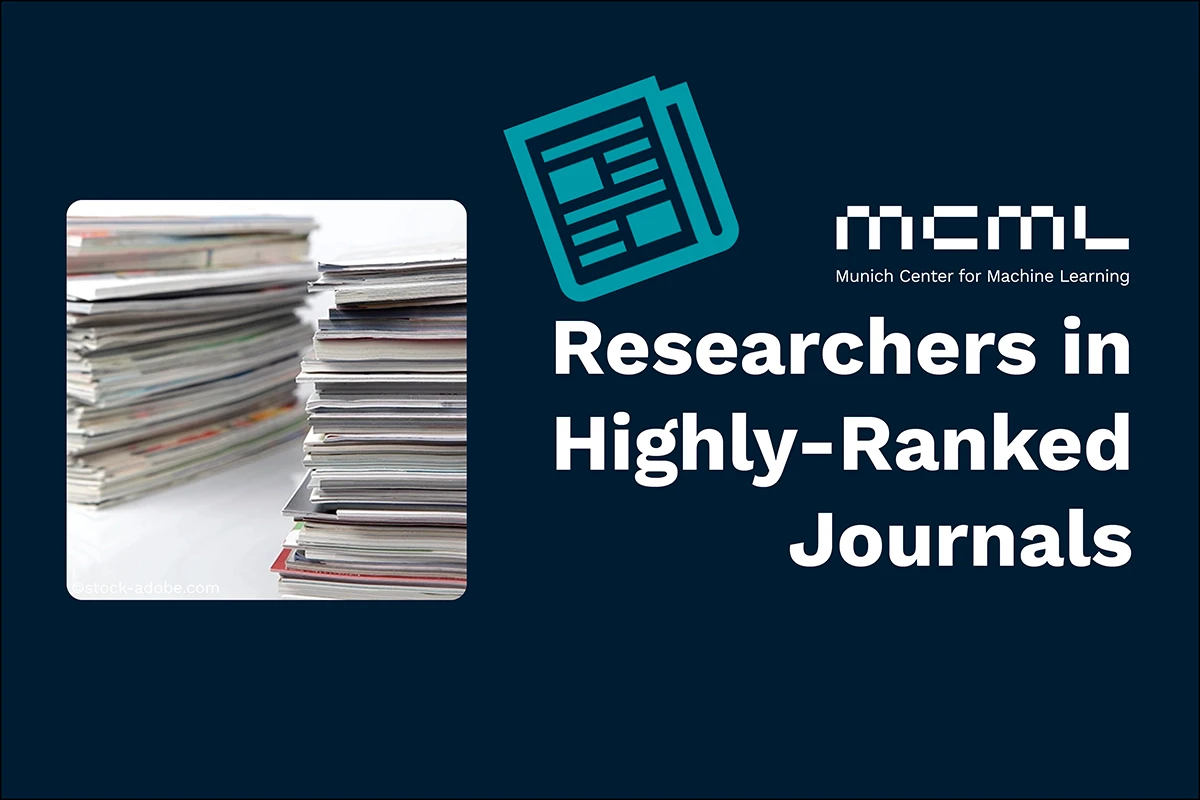Research Group Patrick Rinke
Patrick Rinke
is Professor for AI-based Material Science at TU Munich.
His chair is developing electronic structure and machine learning methods and applies them to pertinent problems in material science, surface science, physics, chemistry and the nano sciences.
Team members @MCML
PostDocs
PhD Students
Recent News @MCML
Publications @MCML
2026
[18]

Á. I. Toldy • P. Pisal • O. Krejčí • P. Rinke • A. Santasalo-Aarnio
TheMeCat: Dataset of Thermocatalytic Conversion of CO2 to Methanol.
Scientific Data 13.165. Jan. 2026. DOI
TheMeCat: Dataset of Thermocatalytic Conversion of CO2 to Methanol.
Scientific Data 13.165. Jan. 2026. DOI
2025
[17]
X. Zhu • P. Rinke • D. A. Egger
Predicting the Thermal Behavior of Semiconductor Defects with Equivariant Neural Networks.
Preprint (Nov. 2025). arXiv
Predicting the Thermal Behavior of Semiconductor Defects with Equivariant Neural Networks.
Preprint (Nov. 2025). arXiv
[16]

N. Bhatia • P. Rinke • O. Krejci
Leveraging active learning-enhanced machine-learned interatomic potential for efficient infrared spectra prediction.
npj Computational Materials 11.324. Oct. 2025. DOI
Leveraging active learning-enhanced machine-learned interatomic potential for efficient infrared spectra prediction.
npj Computational Materials 11.324. Oct. 2025. DOI
[15]
L. Lind • H. Sandström • P. Rinke
An interpretable molecular descriptor for machine learning predictions in atmospheric science.
Preprint (Oct. 2025). arXiv
An interpretable molecular descriptor for machine learning predictions in atmospheric science.
Preprint (Oct. 2025). arXiv
[14]
F. Bortolussi • J. Brean • A. Rowell • D. C. S. Beddows • K. Weinhold • P. Mettke • M. Merkel • T. • A. Kumar • S. Barua • S. Iyer • A. Karppinen • H. Sandström • P. Rinke • A. Wiedensohler • M. Dal Maso • M. P. Rissanen • Z. Shi • R. M. Harrison
Exoloring the role of oxygenated organic molecules in new particle formation events with explainable artificial intelligence.
EAC 2025 - European Aerosol Conference. Lecce, Italy, Aug 31-Sep 05, 2025. URL
Exoloring the role of oxygenated organic molecules in new particle formation events with explainable artificial intelligence.
EAC 2025 - European Aerosol Conference. Lecce, Italy, Aug 31-Sep 05, 2025. URL
[13]
F. Bortolussi • H. Sandström • F. Partovi • J. Mikkilä • P. Rinke • M. Rissanen
Towards atmospheric identification in chemical ionization mass spectrometry with machine learning.
EAC 2025 - European Aerosol Conference. Lecce, Italy, Aug 31-Sep 05, 2025. URL
Towards atmospheric identification in chemical ionization mass spectrometry with machine learning.
EAC 2025 - European Aerosol Conference. Lecce, Italy, Aug 31-Sep 05, 2025. URL
[12]
P. Pisal • O. Krejci • P. Rinke
Machine learning accelerated descriptor design for catalyst discovery in CO2 to methanol conversion.
PSI-K 2025 - 7th PSI-K Conference. Lausanne, Switzerland, Aug 25-28, 2025. DOI
Machine learning accelerated descriptor design for catalyst discovery in CO2 to methanol conversion.
PSI-K 2025 - 7th PSI-K Conference. Lausanne, Switzerland, Aug 25-28, 2025. DOI
[11]
N. Bhatia • O. Krejci • S. Botti • P. Rinke • M. A. L. Marques
MACE4IR: A foundation model for molecular infrared spectroscopy.
Preprint (Aug. 2025). arXiv
MACE4IR: A foundation model for molecular infrared spectroscopy.
Preprint (Aug. 2025). arXiv
[10]
J. Brean • F. Bortolussi • A. Rowell • D. C. S. Beddows • K. Weinhold • P. Mettke • M. Merkel • A. Kumar • S. Barua • S. Iyer • A. Karppinen • H. Sandström • P. Rinke • A. Wiedensohler • M. Pöhlker • M. Dal Maso • M. Rissanen • Z. Shi • R. M. Harrison
Traffic-Emitted Amines Promote New Particle Formation at Roadsides.
ACS ES&T Air 2.8. Jul. 2025. DOI
Traffic-Emitted Amines Promote New Particle Formation at Roadsides.
ACS ES&T Air 2.8. Jul. 2025. DOI
[9]

R. R. Valiev • R. T. Nasibullin • H. Sandström • P. Rinke • K. Puolamäki • T. Kurten
Predicting intersystem crossing rate constants of alkoxy-radical pairs with structure-based descriptors and machine learning.
Physical Chemistry Chemical Physics 27.28. Jun. 2025. DOI
Predicting intersystem crossing rate constants of alkoxy-radical pairs with structure-based descriptors and machine learning.
Physical Chemistry Chemical Physics 27.28. Jun. 2025. DOI
[8]

P. Pisal • O. Krejci • P. Rinke
Machine learning accelerated descriptor design for catalyst discovery in CO2 to methanol conversion.
npj Computational Materials 11.213. Jun. 2025. DOI
Machine learning accelerated descriptor design for catalyst discovery in CO2 to methanol conversion.
npj Computational Materials 11.213. Jun. 2025. DOI
[7]
J. Baumsteiger • L. Celiberti • P. Rinke • M. Todorović • C. Franchini
Exploring Noncollinear Magnetic Energy Landscapes with Bayesian Optimization.
Digital Discovery 4.6. May. 2025. DOI
Exploring Noncollinear Magnetic Energy Landscapes with Bayesian Optimization.
Digital Discovery 4.6. May. 2025. DOI
[6]

H. Sandström • P. Rinke
Similarity-based analysis of atmospheric organic compounds for machine learning applications.
Geoscientific Model Development 18.9. May. 2025. DOI
Similarity-based analysis of atmospheric organic compounds for machine learning applications.
Geoscientific Model Development 18.9. May. 2025. DOI
[5]

Y. Zhang • M. Vaara • A. Alesafar • D. Bach Nguyen • P. Silva • L. Koskelo • J. Ristolainen • M. Stosiek • J. Löfgren • J. Vapaavuori • P. Rinke
Data-efficient optimization of thermally-activated polymer actuators through machine learning.
Materials and Design 253.113908. May. 2025. DOI
Data-efficient optimization of thermally-activated polymer actuators through machine learning.
Materials and Design 253.113908. May. 2025. DOI
[4]

H. Homm • J. Laakso • P. Rinke
Efficient dataset generation for machine learning halide perovskite alloys.
Physical Review Materials 9.053802. May. 2025. DOI
Efficient dataset generation for machine learning halide perovskite alloys.
Physical Review Materials 9.053802. May. 2025. DOI
[3]
P. Henkel • J. Li • P. Rinke
Design Rules for Optimizing Quaternary Mixed-Metal Chalcohalides.
Preprint (May. 2025). arXiv
Design Rules for Optimizing Quaternary Mixed-Metal Chalcohalides.
Preprint (May. 2025). arXiv
[2]

F. Bortolussi • H. Sandström • F. Partovi • J. Mikkilä • P. Rinke • M. Rissanen
Technical note: Towards atmospheric compound identification in chemical ionization mass spectrometry with pesticide standards and machine learning.
Atmospheric Chemistry and Physics 25.1. Jan. 2025. DOI
Technical note: Towards atmospheric compound identification in chemical ionization mass spectrometry with pesticide standards and machine learning.
Atmospheric Chemistry and Physics 25.1. Jan. 2025. DOI
[1]

K. Ghosh • M. Todorović • A. Vehtari • P. Rinke
Active learning of molecular data for task-specific objectives.
The Journal of Chemical Physics 162.014103. Jan. 2025. DOI
Active learning of molecular data for task-specific objectives.
The Journal of Chemical Physics 162.014103. Jan. 2025. DOI
©all images: LMU | TUM





